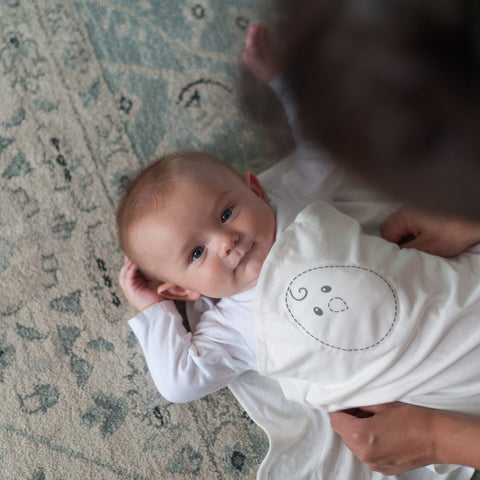Swaddling Causes SIDS As Protein Causes Weight Gain

We know how much the media loves controversy, so it played right into the hands of media when an AAP meta-analysis study was published drawing relations between swaddling and SIDS. You probably remember the study – and the media attention that came with it. Suddenly, swaddling (one of the oldest baby care practices in the world) was a big no-no because of its ties to SIDS. While you probably read most of the news articles on the link, you might have never gotten around to reading the actual study, which concluded as follows:
“Current advice to avoid front or side positions for sleep especially applies to infants who are swaddled. Consideration should be given to an age after which swaddling should be discouraged.”
This study caused all news outlets including CNN, the New York Times and many others to go wild, setting off alarms in many new parent’s homes. Blaring headlines read “Swaddling Increases the Risk of SIDS”. Now would any new parent want to swaddle their baby after reading this? No, no thank you!

Spinning Out of Context
We don’t blame you for being worried…we were too! Was swaddling putting babies at risk? We decided to do a little research of our own to find out.
If you actually read the study, you would realize that there was nothing new being published. It iterated that we already know. Babies should sleep on their backs and swaddling should be stopped after they start rolling over. Did we not know that the risk of SIDS is higher when babies are placed on their front or side? Did we not know that babies should not be swaddled after they start rolling over? YES, we did. Nothing new there. But does that mean that swaddling causes SIDS or increases the risk of SIDS even when the above safe sleep habits are practiced? Not really!!
Protein vs. Weight Gain
Now I know what you’re thinking: “what does this have to do with swaddling and SIDS?” Well, not much. BUT the myth that protein causes weight gain is pretty similar to the myth that swaddling causes SIDS: it’s simply not true when done correctly and safely.
Without pre-qualifying it with baby’s sleeping position, saying “swaddling increases the risk of SIDS” is as true as this statement “New study shows that intake of protein is associated with weight gain.” Google it – we did. If you Google protein and weight gain, you will find just as many links offering studies linking weight gain to protein intake. However, if you read further you will notice that an over intake of protein in a diet is associated with storing the extra protein as body fat leading to weight gain, meaning that weight gain is seen in people eating way too much protein. Kind of like how an increased risk of SIDS has been seen in babies that are sleeping in a dangerous position (like on their stomachs) while swaddled. Now do we really need a 4 page article to tell us that overeating causes weight gain? My mom could have told me that without a PhD.
So is protein evil? Nope! In fact, your body needs protein. Same goes for swaddling! Your baby may not need swaddling to survive, but the many benefits of swaddling make it a must for moms!
Doctors Weighed in On Swaddling Study
When media inappropriately denounced swaddling many came to the rescue. In their article, “Swaddling OK: Stomach Sleeping Raises SIDS Risk” nrp.org offers a fair and balanced explanation of the study to ease anxious parents. Dr. Harvey Karp, the Justin Timberlake of swaddling, in his Huff Po article Keep on Swaddling also explained how the studies were based on inadequate data and therefore cannot connect swaddling to an increased risk of SIDS.
SIDS is a scary subject with little known. When a baby 0-12 months old dies suddenly with no known causes, SIDS is listed as the cause. However researchers have found preconditions such as a smoking parent, blockage in arousal pathways of the baby’s brain, apnea etc. associated with documented SIDS cases. We pored over many medical papers and presented this information on SIDS in somewhat layman terms. You can read the article here: “SIDS – The Facts and What They Mean”.
Media's love to hype scientific findings
Media has an unyielding love for science. Why not? Wouldn’t you feel smart and intellectual when you quote a bunch of researchers? Go on, try it! At your next party just start a sentence with “Did you know that a new study has shown that….” and complete it with something ridiculous as “…we share 99% of our DNA with roaches?” and see how many of your guests will refute it*. Chances are, not many… if at all. Jon Oliver did a fantastic bit on this some time back. Here it is for your viewing pleasure. Enjoy!
Why Bring This Up Now?
You may ask, why are we posting this story today in March 2017 almost a year after AAP released this study? Well, because one of the prominent researchers in the original AAP study Dr. Rachel Moon published an article on January 2017 clarifying “It is fine to swaddle your baby” , but with a caution to make sure that they on their back, the swaddle is not too tight and that the baby is not rolling over.
Now that you have heard it from the experts, we mere mortals can reiterate how beneficial swaddling really is. Swaddling helps control startle reflex or Moro reflex experienced by babies in the first 3-4 months of their lives, creates a womb like environment, calms an over-stimulated baby and promotes sound sleep. Like anything it needs to be done correctly, by following safe sleep habits. You can find more information on SIDS here.
We wrote this article for your education and amusement. Let us know where you stand on the subject of swaddling. Are you weary of swaddling due to these studies? We would love to hear from you.

